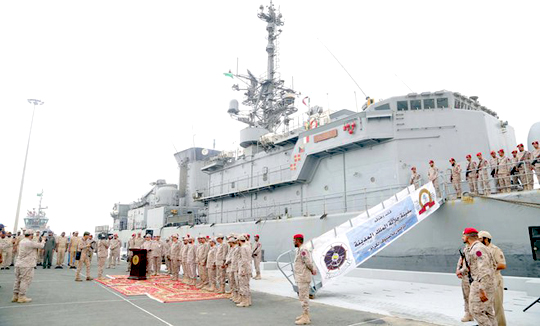Jeddah, Feb 6: A Saudi warship targeted last month by Houthi suicide attackers returned to base on Sunday after completing its mission.

The Al-Madinah warship of the Royal Saudi Navy was in late January hit by a terrorist boat attack off the Yemeni port of Hodeidah, killing two crew members.
It returned early Sunday to the King Faisal Naval Base in Jeddah, after completing its duties according to the scheduled timeframe, without any delay as a result of the attack by the Iran-backed insurgents.
Senior officers welcomed the warship back to the naval base.
They included Lt. Gen. Abdul Rahman bin Saleh Al-Bunyan, chief of staff of the Saudi armed forces, Gen. Abdullah bin Sultan Al-Sultan, commander of the Royal Saudi Navy, and Western Fleet Commander Saeed bin Mohammed Al-Zahrani.
The chief of staff met with the ship’s crew and officers and conveyed to them the greetings of Deputy Crown Prince Mohammed bin Salman, second premier and minister of defense, who praised the crew’s courage in dealing with the attack.
Al-Bunyan listened to a briefing by the captain of the warship regarding the terrorist attack, how it was countered, and how a resulting fire was swiftly tackled.
He expressed pride in the members of the Royal Saudi Navy for participating in military operations carried out by the alliance to support legitimacy in Yemen.
Two Saudi crew members were killed and three others were injured in the suicide attack on the Saudi patrol frigate, the Arab coalition headquarters said last week.
The Saudi navy warship reacted to the attack as required, but one of the Houthi boats rear-ended the vessel, resulting in an explosion and fire at the rear of the Saudi ship, which was extinguished by the crew.
The frigate was patrolling the coast of Yemen when the attack by three suicide boats took pace, the coalition in support of the legitimate Yemeni government said earlier.
The warship’s mission involved protecting the territorial waters of the Kingdom and Yemen, in addition to ensuring the safety of international navigation lines in the strategic Bab Al-Mandab Strait.
Al-Bunyan stressed that the damage to the warship was limited to a small area at the back of the vessel, due to the collision with the terrorist’s boat.
He added that the incident will not prevent the coalition forces from continuing their military operations, until they achieve their key target of helping the Yemeni people and the legitimate government in restoring the state and protecting it from Houthi militias.
Retired Gen. Shami Al-Zahiri, who was the first captain of the frigate in 1985, recalled memories during his more than six years as commander of the ship.
“After spending all this time, it was painful for me to hear that this ship came under attack by Houthi militias,” he told Arab News.
The retired general defended the warship’s technical abilities and its ability to counter a terror attack of this nature.
“I heard how some media outlets have been criticizing the ship’s technical abilities and its leadership after the terrorist attack. I think they need to read more about the circumstances of the incident such as the weather condition and how the terrorist’s boat approached the ship before they make pre-judgmental accusations,” he said.






Comments
Add new comment